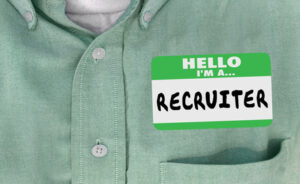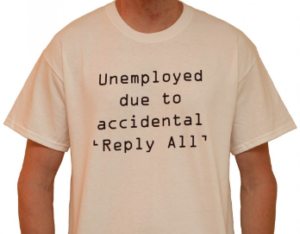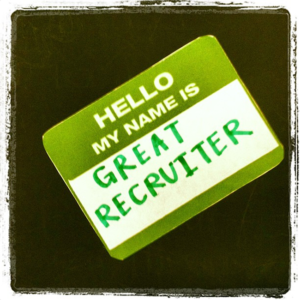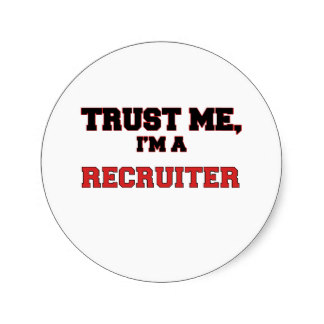How many times did you hear, “You don’t have enough experience.” while looking for your first job?
I heard that statement many times during my search. It was a strange situation. I didn’t have enough experience for them, but I couldn’t get any because many of them would only hire people with experience.
It was a Catch-22.
We all start our careers somewhere, and most of us start without any experience after finishing school and in a junior position. Slowly, we gained more experience from our more senior colleagues, mentors, and from all the mistakes that we made along the way.
We grew into more senior roles.
You can’t become a senior member of an organization if you don’t have any experience. None of us immediately started in a senior role without, first, learning our craft. This is applicable not only to recruiters but to other professions, too. But we often forget about that first year when we struggled trying to find our place.
Don’t forget where you came from
Recently, I saw a number of LinkedIn posts where people shared that junior recruiters don’t have enough experience to interview managers and directors. One post, in particular, stuck in my mind. A manager believed that he should speak only with the senior recruiter and not the junior one, and he shared some details from his last interview.
He showed up for an interview for a new position, but when he found out that the junior recruiter would be the one conducting his interview him, he left. And based on that LinkedIn post, he seemed pretty proud of it. He left because the junior recruiter, in his opinion, did not have enough skills to assess his experience, and that only a senior recruiter could understand that.
My first reaction after I read that post was, “Is he serious?” followed by “Is he really a senior person?” because he’s not acting like one. Well, I can’t lie; my first reaction was something that I can’t post here.
I was curious about what other recruiters thought about this, so I shared his post and asked others if they had faced something like this in their careers.
I was lucky that I never had, but I remembered one situation that happened to one of my colleagues many years ago at a previous job. She was supposed to have an interview with a senior manager, but the manager canceled the interview with her because he was expecting to speak with a senior recruiter.
Every interaction is an interview
At that time, her job title was “junior recruiter,” and just because of that title, he canceled it. The recruiting team, as a whole, refused his request, but to be honest, I still regret not having called him directly to share my feedback. But sometimes you can’t do this sort of thing because your actions affect the reputation of the entire team.
 The manager that posted that comment that I mentioned before left the interview, and he didn’t just leave he but ran away, as he described it in his post. He could have previously had a similar bad experience that helped fuel his strong reaction in this case, but I don’t think that all recruiters act badly.
The manager that posted that comment that I mentioned before left the interview, and he didn’t just leave he but ran away, as he described it in his post. He could have previously had a similar bad experience that helped fuel his strong reaction in this case, but I don’t think that all recruiters act badly.
If he had 20 interviews with 20 different recruiters and got the same result, I would ask myself if the problem wasn’t with his attitude, or how he acts in interviews. That’s because in my book, if the result is always the same, the problem doesn’t lie on the side of the recruiters.
Every interaction we have with others is a mini interview. You never know when you’ll meet them again, so that first impression is important. Everyone has messed up a few of these interactions in their life, and and if that leads to some companies barring their doors to you, well, that’s life.
But remember: The people you meet in life could sit on the other side of the table one day. And they will have the power to decide if you get that new job or not. That’s why a good reputation is incredibly valuable and important.
I’m curious as to what that “interview runner” would say if the recruiter who was cancelled hadn’t been a young person, but instead, had been an experienced person in their 50s. Maybe age, and not the job title, was a deciding factor for that “runner.”
It’s all about respect
If you think that sharing these posts with others is the right thing to do, here are a few things you should know:
- These posts are not funny, even if you try to make them sound funny. The only thing you are doing is killing your personal brand.
- With every “like” you get, your chances of getting a new job shrink a little. Every “like” under your post makes it more visible to others. And if you believe that some recruiter will call you because of that post, think again. Most of us support other recruiters and nobody wants to work with haters or invite them in. And who sees these posts? The people who are on LinkedIn 24/7 — the recruiters.
- People like to share, and recruiters are no exception. We all share and we certainly share the bad experiences, too.
- If you post something similar to our “runner,” you will be looking for a new job at least 3-4 times longer than other people with similar skills. And, it’s likely you will only last 2-3 years in that position. I know that because I did a little research on all the “haters” that I saw on LinkedIn over the last 12 months.
- Even a junior recruiter can put a small note into the ATS that a candidate is not a good fit for the company. That note will be connected with your name for a long time. So even if that recruiter is working somewhere else, the other recruiters from that company will still see the note. And that small note could turn your application into a rejection.
- Recruiters change jobs, too. If you post some hate about a recruiter who is working for Company A, then don’t expect different treatment when he or she starts working at Company B.
- It’s all about “karma“ (yes, sometimes it IS working).
I’m curious what these people who are sharing these posts about bad recruiters are going to post about after they go through an interview with a Chat Bot or Artificial Intelligence. How senior does the AI needs to be? Two years, four years, or maybe more?
Final Thoughts
A job title is only a title. It doesn’t have magical power to turn a person into someone senior and experienced.
The thing that REALLY matters is how that person treats you in the interview. If you’re running from interviews because the interviewer has a junior title, then really, you’re not acting like a “senior” person.
It’s important to treat the cleaning lady with the same respect and courtesy as you treat the CEO. And yes, junior recruiters really DO deserve the same respect as everybody else.
In other words, if you would want to be treated as a “senior candidate,” start acting like one.
Authors
Jan Tegze
Jan Tegze is Senior Recruiting Manager at SolarWinds, a company that “provides powerful and affordable IT management software to customers worldwide, from Fortune 500 enterprises to small businesses, managed service providers (MSPs), government agencies, and educational institutions.” He is also the author of the book Full Stack Recruiter: The Modern Recruiter's Guide, published October 2017. Jan has extensive experience in full life cycle recruiting, and broad knowledge in international recruiting, sourcing, recruitment branding, marketing and pro-active innovative sourcing techniques. Connect with him on LinkedIn or follow him on Twitter @jantegze .
Recruit Smarter
Weekly news and industry insights delivered straight to your inbox.





